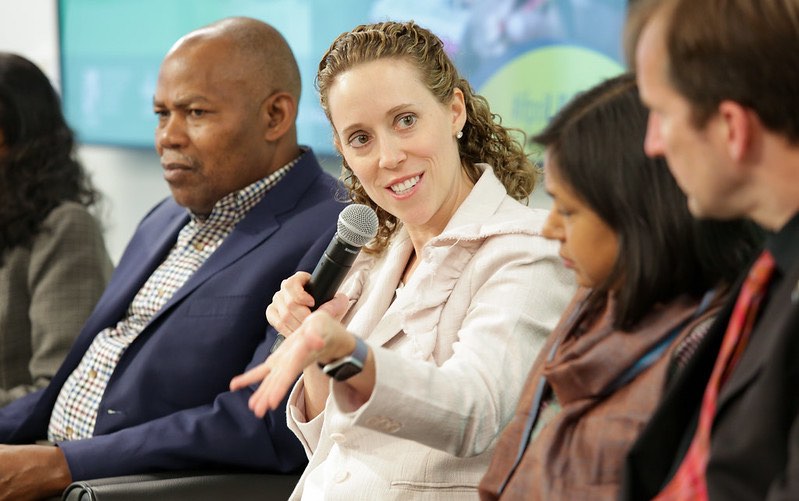Access to information, whether it is a citizen seeking information on her local politicians’ mandate or a state minister seeking data on the performance of a local municipality, is critical for improving the quality of life of people living in rural areas. Although such access is slowly expanding in low-income countries, big questions remain about which types of information, delivery mechanisms, and institutional arrangements are best for improving rural services and governance.
The journal World Development addresses these questions in a recent special issue on the theme Information, Governance, and Rural Service Delivery, co-edited by IFPRI Senior Research Fellow Katrina Kosec and Princeton Professor Leonard Wantchekon (see their recent blog post on the topic). An Oct. 21 IFPRI policy seminar explored these issues.
The world is in the middle of an information revolution, Kosec told the audience, with technological advances affecting all aspects of life, from social media advancing or hindering autocracies to the ubiquitous internet presence of politicians in democracies. “More than half of people in low-income countries have mobile/cellular technologies [and more are using the internet] … this is massively going to change policies,” she said.
The co-editors developed a conceptual framework in their introduction paper to the special issue, predicting when information can help improve rural governance. Citizens must perceive the information as relevant (and have the education to understand it and disentangle it from misinformation), and must have the incentives and power to act upon their newfound knowledge, such as through voting, protesting, or petitioning the government. To understand the impacts of information, the co-editors further did a systematic review of the published evidence. Fifty eight percent of the studies they found showed that information can lead to better governance—and improvements were realized if and only if these conditions were met. In addition, governments can increase the flow of information by supporting a free press, publicly posting information on budgets and policies, using technology to improve efficiency and monitoring in service delivery, and involving citizens in decision-making.
Center for Global Development Senior Fellow David K. Evans discussed the impact of conditional cash transfers on rural residents’ trust in local government. That impact is still not well understood: Cash transfers may prompt residents to view the government more favorably, but in some cases local conditions foster jealousy and resentment.
Evans presented his study of Tanzania, where decentralized government committees provided cash transfers to low-income households conditioned on health clinic visits and school attendance. “One of the striking things we found was that in communities that received these cash transfers [and where regular community meetings were held], trust in elected leaders rose significantly, but trust in appointed bureaucrats did not change,” Evans said. Trust did not increase where meetings were not held. The community meetings, as a platform for conveying information about development projects, budgets, and local elections, thus improved trust.
In India, women’s self-help groups cover more than 5 million households and are a force for improving access to information, IFPRI Senior Research Fellow Neha Kumar said. An evaluation of the non-governmental organization PRADAN’s self-help groups found that women’s membership led to greater political participation, greater use of select public entitlement programs (but no impact on awareness of other programs), and a positive impact on social capital and public speaking. “Self help groups do have the potential to increase their members’ ability to hold public entities accountable and demand what is rightfully theirs,” Kumar said. However, a deliberate effort is needed to increase awareness of available rural services.
Tewodaj Mogues, a senior economist and technical assistance advisor at the International Monetary Fund (IMF), probed why a pattern of agricultural mis-investments persists in many countries—despite the availability of sound information on returns. Mogues presented research in Nigeria with colleague Tolulope Olofinbiyi that found that some state governors and other executives with limited agricultural expertise have excessive influence in setting agricultural budgets. At the same time, those with the knowledge are disempowered in decision-making.
This power vs. information tension exists at many levels of government. For example, state governments often exercise strong control over local government budgets, even though local officials have superior information about their jurisdictions. Another factor: Citizens cannot visibly see the outcomes of agricultural investments. “Politicians take advantage… [of] the fact that citizens have very limited information about which types of outcomes … that affect their lives are attributable back to the actions of government,” she said.
Though most governance literature focuses on the putative links between better information and community-driven development, Wantchekon said, there is inconsistent evidence on whether such approaches improve development outcomes. He offered some theories as to why this may be the case. People obtain information through different means (firsthand vs. secondhand, from a credible source vs. a noncredible source), such that the original information (or truth) is rarely the information that is acted upon. Effectively engaging citizens may also depend on the details of participation, such as whether a town hall meeting on a local issue allows voting, generates a debate, and so on. “We need to think of a different approach which will not only focus on information and a vaguely defined notion of participation, but combine these concepts to see how they shape social capital and institutions,” he said. “In one case, people are being directed, and in another case, they are being empowered.”
The special issue comprises nine papers from differing geographic contexts and types of rural services, and offers lessons for policy makers and researchers interested in the promise of information for improving service delivery.
Sivan Yosef is a Senior Program Manager in IFPRI’s Director General’s Office.







